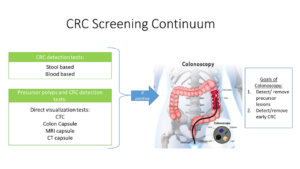
Non-invasive tests for colon cancer screening may change the way we think about colonoscopies, according to Aasma Shaukat, MD, MPH, Robert M. and Mary H. Glickman professor of medicine and director of GI Outcomes Research at the NYU Grossman School of Medicine, who spoke about the subject during Digestive Disease Week® (DDW) 2022.
“Non-invasive tests offer great advantages for screening purposes,” said Dr. Shaukat. “They’re lower risk, more readily available and they don’t have the same barriers as initial screening colonoscopy. However, they probably need to be repeated more frequently. And if the test is positive, then those individuals need to get a colonoscopy.”
Dr. Shaukat is hopeful that these tests will increase the number of patients who get screened for colon cancer and will reach previously underserved populations. “We think this is a good strategy to bring in populations that generally don’t sign up for colonoscopies,” said Dr. Shaukat, “like the very young or very old, and populations that have traditionally been underserved, such as racial minorities and rural residents.”
Gastroenterologists may soon have a range of non-invasive tests to choose from. Currently, there are two types of stool-based tests commercially available for colon cancer screening. In addition, several blood-based tests, which evaluate the presence of cell-free DNA fragments, RNA markers, or protein markers associated with colon cancer, are being evaluated in clinical trials. Dr. Shaukat is hopeful that at least one of these tests will be approved within a year. She recommended that gastroenterologists start thinking about how to incorporate these new developments into their practice:
- Stool-based tests: Evaluate whether your practice should offer at least one of the two available tests.
- Blood-based tests: Be aware of the current tests under investigation and evaluate what type of infrastructure your practice would need to offer these, such as a mobile phlebotomy service that could do blood draws without requiring patients to come into the clinic.

“The title of my talk asks whether we still be doing screening colonoscopy in 10 years,” she continued. “And the answer is ‘yes’ but to a lesser extent. Gastroenterologists need not fear that screening colonoscopies will completely disappear. But the indication for colonoscopies will begin to shift from an initial screening tool to a confirmatory test.”
Dr. Shaukat gave the oral presentation, “Will I still be doing screening colonoscopy in 10 years & what are the key competitors?” on Saturday, May 21, at 8:54 a.m. PDT as part of the session “Colonoscopy and Colorectal Cancer Screening: Answering Key Questions for Your Practice.”



One Response
Colonoscopy remains the best tool. I suggest other testing ONLY if patient agrees in advance to undergo colonoscopy if the non-invasive test is positive. I really don’t like Cologuard much as it gives false +’s and scares the crap out of patients when positive.